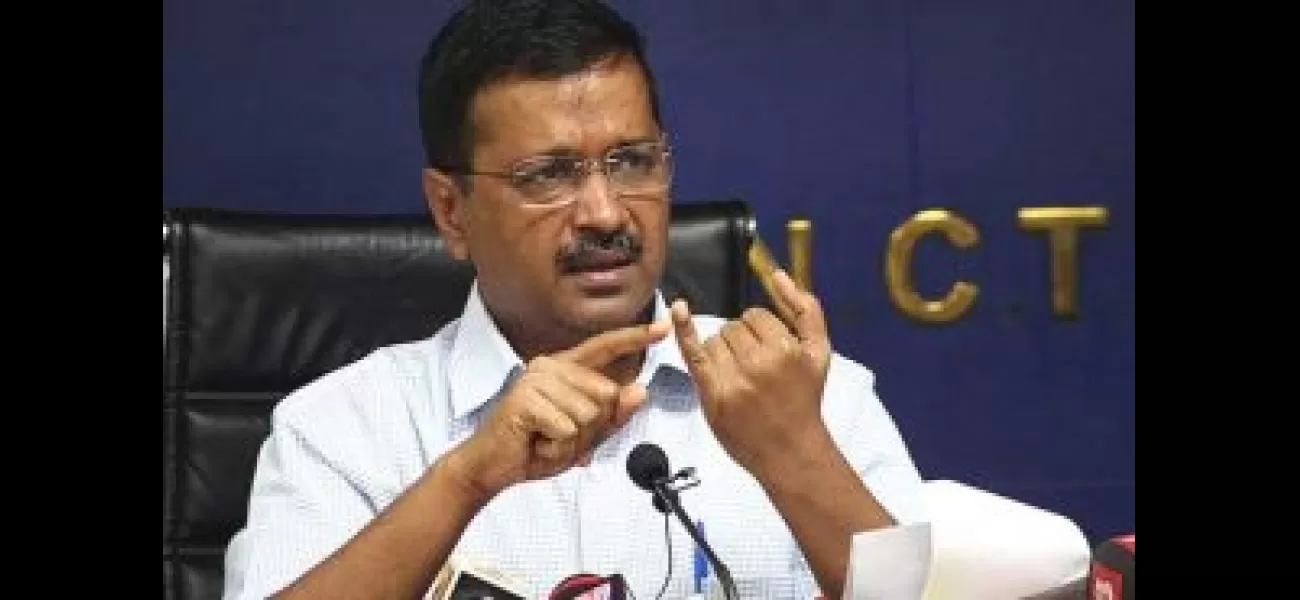Kejriwal's bail in money laundering case revoked by HC.
Delhi High Court blocks Arvind Kejriwal's bail in an alleged money laundering case due to trial court's failure to review evidence from the Enforcement Directorate.
June 25th 2024.

In a recent turn of events, the Delhi High Court has dealt a blow to Chief Minister Arvind Kejriwal by staying the trial court's decision to grant him bail in a money laundering case related to the alleged excise scam. The court has held that the lower court did not appropriately consider the material presented by the Enforcement Directorate (ED) in the case.
A vacation bench, presided over by Justice Sudhir Kumar Jain, has stated that the ED's arguments against the bail order require serious consideration. The court has stated that the lower court did not properly evaluate the evidence and arguments put forth by the ED, and thus, has put a stay on the operation of the bail order.
The trial court, under vacation judge Niyay Bindu, had granted bail to Kejriwal on June 20, with a personal bond of Rs 1 lakh. However, the very next day, the ED moved the high court, claiming that the bail order was biased and passed without giving them a fair chance to argue their case. In its 34-page order, the high court has asserted that it is the responsibility of every court to give sufficient opportunity to both parties to present their case. In this case, the ED should have been given the chance to argue against Kejriwal's bail application.
Justice Jain has also pointed out that the trial judge did not discuss and record its view on the "twin conditions" required for granting bail under section 45 of the Prevention of Money Laundering Act. These conditions include the court being satisfied that the accused is not guilty of the offence and giving the prosecutor a chance to oppose the bail application. Additionally, the issue of Kejriwal's vicarious liability as the head of the Aam Aadmi Party was not addressed in the bail order.
The court has opined that the trial court's order shows a lack of consideration for the evidence presented by both parties, and thus, reflects perversity. The ED's lawyer, Sh. S. V. Raju, has argued that the vacation judge did not pass the order after fully considering all the evidence on record. The court has also noted that the trial judge's observation that it is not possible to go through thousands of pages of documents is unwarranted and should have been avoided.
The court has also stated that the trial court should have exercised judicial discipline and refrained from making baseless allegations against the ED. It has also rejected Kejriwal's argument that his arrest and remand were not in accordance with law, as the Supreme Court had granted him interim bail due to the upcoming Lok Sabha elections.
The court has also dismissed the argument that Kejriwal should not be remanded to judicial custody again, as the stay order on his bail is being seriously challenged by the ED. On June 20, the trial court had granted bail to Kejriwal, stating that the ED failed to provide direct evidence linking him to the proceeds of crime in the money laundering case. However, the high court has stayed this order and has issued a notice to Kejriwal, seeking his response to the ED's plea. The case will be heard on July 10 before the roster bench.
In the meantime, Kejriwal has approached the Supreme Court against the interim stay on his bail. However, the apex court has postponed the hearing until June 26, as it would like to wait for the high court's decision. The alleged excise scam came to light in 2022 when the Delhi lieutenant governor ordered a CBI investigation into the formulation and execution of the excise policy. The CBI and ED have claimed that there were irregularities and corruption involved in the modification of the policy and the granting of undue favors to license holders.
A vacation bench, presided over by Justice Sudhir Kumar Jain, has stated that the ED's arguments against the bail order require serious consideration. The court has stated that the lower court did not properly evaluate the evidence and arguments put forth by the ED, and thus, has put a stay on the operation of the bail order.
The trial court, under vacation judge Niyay Bindu, had granted bail to Kejriwal on June 20, with a personal bond of Rs 1 lakh. However, the very next day, the ED moved the high court, claiming that the bail order was biased and passed without giving them a fair chance to argue their case. In its 34-page order, the high court has asserted that it is the responsibility of every court to give sufficient opportunity to both parties to present their case. In this case, the ED should have been given the chance to argue against Kejriwal's bail application.
Justice Jain has also pointed out that the trial judge did not discuss and record its view on the "twin conditions" required for granting bail under section 45 of the Prevention of Money Laundering Act. These conditions include the court being satisfied that the accused is not guilty of the offence and giving the prosecutor a chance to oppose the bail application. Additionally, the issue of Kejriwal's vicarious liability as the head of the Aam Aadmi Party was not addressed in the bail order.
The court has opined that the trial court's order shows a lack of consideration for the evidence presented by both parties, and thus, reflects perversity. The ED's lawyer, Sh. S. V. Raju, has argued that the vacation judge did not pass the order after fully considering all the evidence on record. The court has also noted that the trial judge's observation that it is not possible to go through thousands of pages of documents is unwarranted and should have been avoided.
The court has also stated that the trial court should have exercised judicial discipline and refrained from making baseless allegations against the ED. It has also rejected Kejriwal's argument that his arrest and remand were not in accordance with law, as the Supreme Court had granted him interim bail due to the upcoming Lok Sabha elections.
The court has also dismissed the argument that Kejriwal should not be remanded to judicial custody again, as the stay order on his bail is being seriously challenged by the ED. On June 20, the trial court had granted bail to Kejriwal, stating that the ED failed to provide direct evidence linking him to the proceeds of crime in the money laundering case. However, the high court has stayed this order and has issued a notice to Kejriwal, seeking his response to the ED's plea. The case will be heard on July 10 before the roster bench.
In the meantime, Kejriwal has approached the Supreme Court against the interim stay on his bail. However, the apex court has postponed the hearing until June 26, as it would like to wait for the high court's decision. The alleged excise scam came to light in 2022 when the Delhi lieutenant governor ordered a CBI investigation into the formulation and execution of the excise policy. The CBI and ED have claimed that there were irregularities and corruption involved in the modification of the policy and the granting of undue favors to license holders.
[This article has been trending online recently and has been generated with AI. Your feed is customized.]
[Generative AI is experimental.]
0
0
Submit Comment





